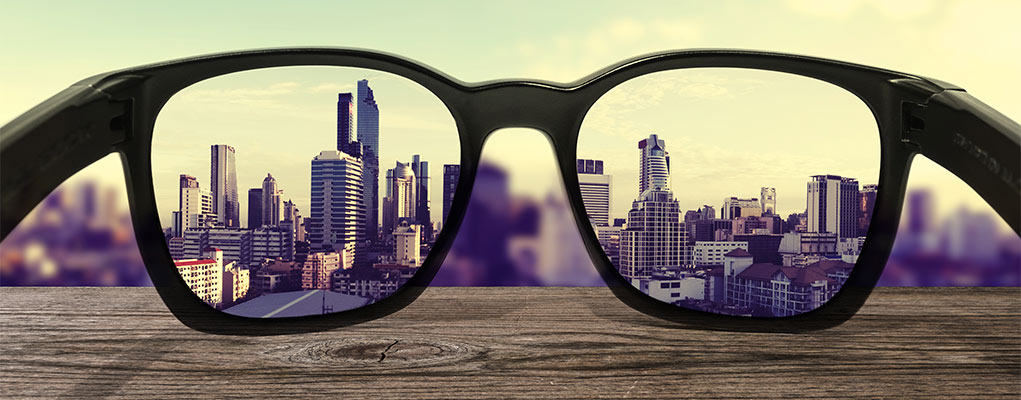
Simple Tips for Everyday Vision Problems
August 1, 2024
Of our five senses, vision is by far our most important. In fact, 83% of our perception is processed through our eyesight. May is Healthy Vision Month, the perfect time to learn how to protect your eyes. Here are a few everyday vision problems and simple tips to prevent them.
In this Healthy Insight
- Dry Eye
- Dry Eye Prevention
- Eyestrain
- Eyestrain Prevention
- Nighttime Driving Safety Tips
- Vision Supplements

Dry Eye
If you’ve got dry eyes, you know the discomfort – burning, red, light-sensitive eyes. Dry eye occurs when your tear production is inadequate. It can be worsened by airplane travel, wind, sun or something that many of us do all day – staring at computer screens and devices. Lifestyle changes and eyedrops can help, but for prolonged symptoms, you may need to speak with your doctor.
Dry Eye Prevention
Pay attention to situations where you experience dry eyes. Some common ways to prevent dry eyes include the following:
- Use an indoor humidifier to add moisture to the air.
- Avoid blowing air from hair dryers, heaters, air conditioners or fans into your eyes.
- Take frequent eye breaks. When working on the computer or reading a book, take breaks every 20 minutes by briefly closing your eyes or focusing on an object in the distance.
- Position your computer below eye level. You don’t need to keep your eyes open as wide when you look down at your monitor. This may slow evaporation of tears.
- Avoid smoking or smoke in general. Both can exacerbate dry eyes.
- Wear sunglasses outside. You might consider the wraparound type to reduce drying from wind and sun.

Eyestrain
Closely related to dry eye, eyestrain is often caused by intense use like reading for hours on end, driving long distances, straining to see in dim light, or staring at screens non-stop. Computer use creates more eyestrain than reading print material because you tend to blink less frequently. Many of us use a device with a reflective screen or has poor contrast between text and background. People who look at screens for two or more hours in a row every day (who doesn’t?!) have the greatest risk. There’s even a term for it – computer vision syndrome.
Symptoms of eyestrain include:
- Tired, sore eyes
- Headache
- Blurry vision
- Sore neck or shoulders
- Difficulty concentrating
The good news is that eyestrain does not lead to eye damage, but it is uncomfortable and can affect the quality of your work.
Eyestrain Prevention
Here too, lifestyle changes can be effective. Take frequent breaks, be aware of blinking, and reduce ambient light around your monitor to reduce glare. Adjust the brightness and contrast levels and increase text size. With both eyestrain and dry eyes, over-the-counter eye drops can help. If these changes are not effective, consult your ophthalmologist.
Nighttime Driving
Starting in your 30s, the ability to see in limited light begins to gradually diminish. The dark makes it more difficult to distinguish objects, color, and depth, and your peripheral vision can be affected. The glare of oncoming headlights can temporarily blind you and the reflection off wet pavement can blur road markings.

Nighttime Driving Safety Tips
- Keep it clean. Make sure your windshield (inside and out), mirrors and lights are clean. Barely noticeable streaks during the day can blur nighttime vision.
- Avoid being blinded by oncoming headlights. Don’t look directly at the lights, instead focus on the right-hand side of the road or line marking until the oncoming car has passed.
- Use anti-reflective coatings on your prescription eyeglasses. This helps reduce glare, halos and streaking.
- Dim dashboard and instrument lights. When they’re bright, they create a distraction. You may have to strain a little more to read the gauges, but this will keep your focus on what’s most important: seeing what’s outside the car.
- Watch for wildlife. Slow down in areas known for wildlife and carefully scan for movement and the reflective eyes of wildlife at night.
- Check mirrors frequently. Fixed concentration can cause “highway hypnosis” where the driver goes into a trance-like state, typically caused by driving long stretches of open highway. Stay alert by actively checking mirrors or briefly glancing around.
Vision Supplements
In addition to the suggestions above, you may want to consider vision supplements. Products containing zeaxanthin and lutein, which is helpful for nighttime driving and contrast, are the gold standard. You’ll also find an enormous array of products for dry eyes,
time-tested herbs and more to keep your eyes comfortable and healthy for a lifetime of good vision.
Make your vision a focus – check out additional vision support supplements here!


